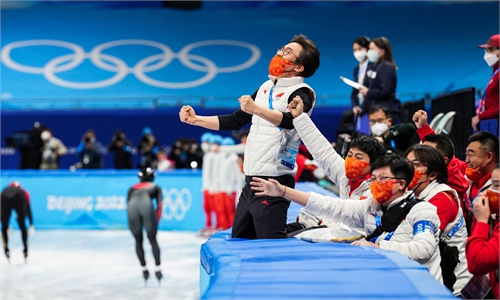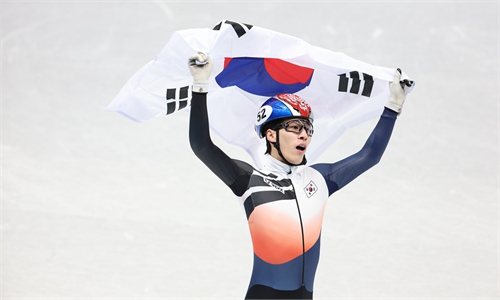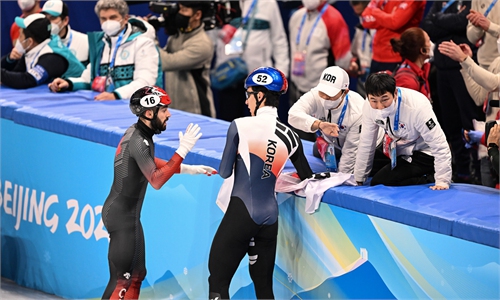IN-DEPTH / DIPLOMATIC CHANNEL
Hosting three Olympics in a row shows elevation of global influence of South Korea, Japan and China: Korean envoy
Enhanced Olympic culture

Kim Jin-gon, minister-counsellor of the Embassy of the ROK in China and director of the Korean Cultural Center in China. Photo: Lin Luwen/GT
Editor's Note:In 2015, China won the bid to host the 2022 Winter Olympic Games, following South Korea, which has become a notable power in the rink in recent decades. Recently, Global Times (GT) reporters Shan Jie, Zhao Juecheng and Lin Luwen talked with Kim Jin-gon (Kim), minister-counsellor at the Embassy of the ROK in China and director of the Korean Cultural Center in China. Kim delivered his observation on the rise of Northeast Asia in winter sports, his understanding of the "Green Olympics," and China-South Korea people-to-people exchanges.
GT: Did you visit some of the venues used for the Beijing 2022 Winter Olympics Games before it started? What was your impression?
Kim: In March 2021, the Beijing Organising Committee for the 2022 Olympic and Paralympic Winter Games invited diplomatic envoys to visit the Olympic facilities. On the first day, we visited the Olympic Village, the ski resort, and the sledding venue in Yanqing district in Beijing's northern suburb. On the second day, we visited the skating rink and other venues in downtown Beijing.
We learned that the Olympic Organising Committee pays great attention to the environment and ecology. During the construction of the Olympic Village, the original trees were well preserved between the buildings. The steel elements used in the 2008 Summer Olympics were reused. The preparations for the Beijing 2022 Winter Olympics have been very practical, economical, and environmentally friendly.
GT: What is your expectation of the Beijing 2022 Winter Olympics Games?
Kim: The Beijing Winter Olympics is the third Olympic Games held in Northeast Asia in five years, following the PyeongChang 2018 Olympic Winter Games and the Tokyo 2020 Summer Olympics held in 2021. I think this is not only about sports, but also a manifestation of the increasing influence of South Korea, Japan and China in the world.
In particular, the Tokyo Olympics and the Beijing Winter Olympics have been greatly affected by the COVID-19 pandemic. I believe that the successful hosting of the Beijing Winter Olympics can raise expectations and confidence all over the world, and enhance unity in working together to overcome the pandemic.
Moreover, through the opening and closing ceremonies and competitions, China can show the world the most advanced science and technology, and excellent traditional culture.
GT: In 2018, South Korea successfully hosted the PyeongChang Winter Olympics. What kind of exchanges and cooperation did China and South Korea carry out during the preparations for the Beijing Winter Olympics?
Kim: Because most of the Winter Olympic events are held outdoors, the environment has a great impact on the preparatory work for the competitions, and the competition process will also be affected by the climate. Therefore, a more detailed and comprehensive rehearsal plan is required.
In August 2017, Cultural Ministers from South Korea, China and Japan reached an agreement to transform the Pyeongchang, Tokyo, and Beijing Olympics into "cultural Olympics." In December 2017, leaders from South Korea and China signed a memorandum of understanding (MOU) on the cooperation between the two Winter Olympics.
During the PyeongChang Olympics, the Beijing Olympic Organising Committee participated in an observer program organized by the PyeongChang Olympic organizing committee. In addition, after the PyeongChang Winter Olympics, in November 2019, relevant personnel from the Beijing 2022 Organising Committee also participated in the specialized ice-making workshop activities organized by the PyeongChang 2018 Legacy Foundation.
GT: The modern ice and snow sports originated in Europe, and the traditional powerhouses of the Winter Olympics are almost all European and American countries. However, the last two editions of the Winter Olympics were held in South Korea and China respectively. How do you think that the role of Asian countries in the Winter Olympics has become increasingly important?
Kim: In traditional ice and snow competitions, European countries have the upper hand. Northeast Asia has four distinct seasons, and the development of winter sports is limited by seasons.
However, we are gradually attaching more importance to winter sports. Moreover, in indoor winter sports such as ice skating, Asian countries are gradually becoming more competitive. In particular, South Korea and China have performed well in short-track speed skating. In events that needs both physical strength and agility, such as figure skating, Asian athletes will gradually gain advantages.
GT: Previously, certain Western countries led by the US had tried to carry out a so-called diplomatic boycott of the Beijing Winter Olympics. What do you think of this type of politicization of the Olympics and sports?
Kim: The position to express a "diplomatic boycott" of the Olympic Games itself seems to be politicizing the Olympic Games, so our attitude should be as cautious as possible. What is important is that sports should be separated from politicization, and the world's peace and mutual understanding should be enhanced through the Olympic Games, which should be a grand sports festival for mankind.
GT: This year marks the 30th anniversary of the establishment of diplomatic relations between China and South Korea, as well as the two countries' Year of Culture Exchanges. What is the progress of the series of activities in the cultural fields between the two countries, as well as the exchanges that could be expected in the future?
Kim: Trade between the two countries exceeded $300 billion in 2021. In my opinion, the rapid development of the relationship between the two countries is because of the economic complementarity, geographical proximity, cultural connection, and people-to-people affinity.
South Korea and China have thousands of years of cultural exchange history. While sharing many cultural commonalities, they also have their own unique cultures. Korean and Chinese cultures are harmonious but different.
I think we need to enjoy a common culture together as a family and feel the same sense of identity. At the same time, we need to understand and learn from different cultures, and recognize and respect each other.
Culture spreads, and it will not remain unchangeable. Those who learn and inherit are the masters of cultures. Therefore, rather than arguing about certain cultural issues, we might as well think that Chinese culture could be found in Korea, and vice versa, which not only conforms to the nature of cultural communication and sharing, but also helps to enhance the friendship between the two countries.




